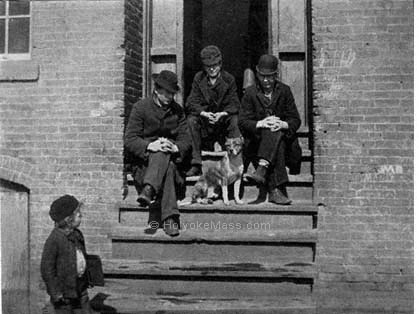
Lyman Street — Out of Work.
|
One of the mill workers presents another aspect of mill life, in the words which I shall try to put down as I heard them: "There are some of the mills treat their help just like machines. They don’t seem to think of them as human beings at all. They don’t think of their comfort, and they seem never to think of their having feelings. They don’t care a cent whether the help live or die, come or go. And the help get a sort of don’t care feeling, too, in such mills. They have no, interest in doing well for their employers but only in getting their pay and keeping their places. Of course a too easy man will be imposed on. He has to have some energy and firmness. But where a man is hard on his help, and always pushing them to get just as much out of them as he can, they will return just as little. The agent who is both kind and considerate as well as firm, awakens a friendly feeling among the help, and an interest that gives better returns than the hard master secures. I know of one agent who used to remember all his help, and bow to them when he met them on the street. You don’t know how much happiness that gave us, and we did better work for it, too. I know of one mill which always takes pains to inquire after their sick help, and those who sickness keeps out always have their places again when they recover if it takes them a year. That is one of the best mills I know of. They are kind and they give good pay, and the result is they can get the most skilled workers and they stay with them many years."
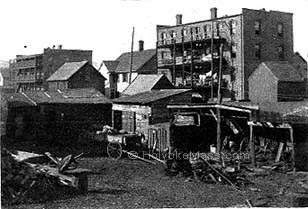
A Rear View.
|
South Holyoke used to be known as "Tiger Town." It was not built up then as it is now with close brick blocks, but was occupied by little scattering houses. It was notable in those days as the home of a lot of "toughs." There was a good deal of the rough, drinking element, and it is said a man couldn’t go down there to sell a load of apples without losing two-thirds of them. Happily it has outgrown this old reputation, but I can say that to-day one needs a guard to go through there with a camera. There are sure to be crowds of children in the doorways and about the streets and alleys, and they at once recognize the instrument and its uses and the air begins to resound with cries of "Please take my picture, mister?" A procession begins to follow me thereupon , and when I stop to set up the camera, the crowd quite hedges me in, and it requires no small effort to make them scatter from before it when I get ready to take off the cap. More than once I had to give up entirely, for the crowd insisted on being in the picture and blankly refused to move.
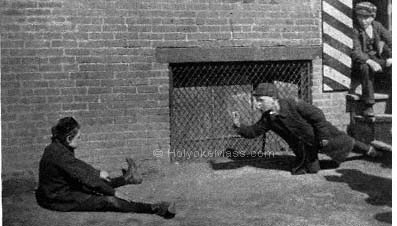
Playing Marbles.
|
As I wandered about there would be incidents like the following: “Come, Jimmy, and have your pitcher taken!” cries a little girl.
"You have to take your hat off," says Jimmy, who, I suppose recollects some experience in a photograph gallery.
"No, you have not," affirms the little girl.
"Oh, Artie, Artie," cries another, “come here and get yer pitcher taken for nothing’. He’ll take it for you for nothin’. Oh, but he’ll make a dandy pitcher.”
"Is there a bird in there?" asked a small boy, pointing at the camera. "You got a bird in there, ain’t you? I had my pitcher taken once. The man had a big thing like what you go. He said there was a bird in there. I heard him squealin’. Gosh, but I was skeered." Children in the photographs often have a pop-eyed look of fright on their faces, but I never knew what the matter was before.
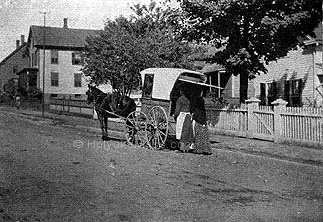
A Holyoke Meat Cart.
|
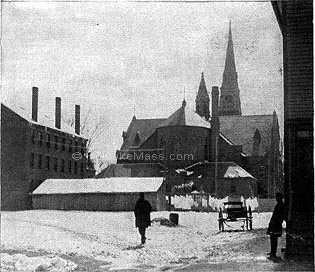
A Lyman Street View of St. Jerome’s Church.
|
© Laurel O’Donnell 1996 - 2006, all rights reserved
This document may be downloaded for personal non-commercial use only
and may not be reproduced or distributed without permission in any format.
This is an edited adaptation from the original publication.
|